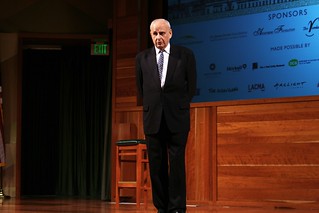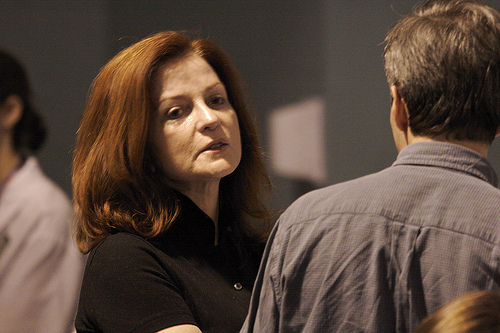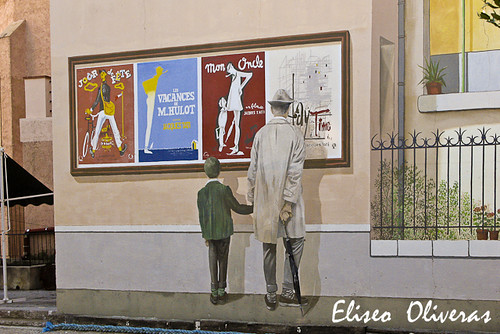
PARIS — VERSAILLES lived again at haute couture week, as designers paraded their let-them-eat-cake creations, hand-stitched with gilt embroidery and trimmed with guiltless fur — frousfrous that no real women can wear and few can afford.
On Friday night, Christian Lacroix offered his homage to Elsa Schiaparelli, but even high fashion couldn’t lift Paris from its low mood. “Liberté, égalité, morosité,” Le Monde declared.
Joie de vivre has given way to gaze de navel. The French are so busy wallowing in their existential estrangement — a state of mind Camus described as “Should I kill myself, or have a cup of coffee?” — that they don’t even have the energy to be rude. And now that they’re smoking electronic cigarettes, their ennui doesn’t look as cool. It’s not that they’ve lost faith in their own superiority. They’ve lost faith that the rest of the world sees it. The whole country has, as Catherine Deneuve says of her crazy blue moods, une araignée au plafond — a spider on the ceiling.
On Place Vendome, Christian Lacroix was dispatching models in black crepe chiffon peplum basques — whatever they are — while on Avenue Hoche, Lacroix’s dentist was bemoaning the black crepe City of Lights. Holding a cigarette in a waiting room filled with Picasso-print pillows, Dr. Gérard Armandou told how his patients, always prone to pessimism, are even more filled with malheur now as they sit in his chair contemplating tous les problèmes, including “not going anymore on holiday to Egypt.”
“Cocteau said the French are Italians in a bad mood, but now there is more morosity,” he said. “We are connecting with nostalgia. What is nostalgia? Where the present doesn’t agree with the hope that you got in the past.”
He said there are widening chasms between sectors of French society — old and young, natives and immigrants, “smokers and nonsmokers, homosexuals and non-homosexuals.”
“Enter conflict, where before there was none,” he said. “The French people, maybe they think too much. The happy stupid don’t see the problem.” People with joie de vivre, after all, are simply not paying attention.
“It’s not the end of the world,” Dr. Armandou said with a Gallic shrug. “It’s the end of one world.”
The French have higher rates of taking antidepressants and committing suicide than most other Europeans. And while arguing about how to move forward, they feel trapped in the past, weighed down by high unemployment and low hopes, the onerous taxes that drove Gérard Depardieu to flee, conflicts with immigrants, political scandals, Hollande fatigue, Germany envy, economic stagnation, a hyperelitist education system, and cold, rainy weather that ruined the famous Paris spring. Instead of confronting the questions at hand — how to adjust to globalization and compete with the Chinese — the French are grieving their lost stature and glorious past, stretching back to the colonial empire, the Lumières, the revolution, Napoleon, even the Jazz Age writers and artists. They’re stuck in a sentimental time warp as vivid as the one depicted in Woody Allen’s “Midnight in Paris.”
“In 1945, France was on the losers’ side, but this reality has long been masked by the political speeches of General de Gaulle and François Mitterrand: they both maintained, in their own way, the idea that it remained a great power promised to an exceptional destiny,” the historian Christophe Prochasson told Le Monde. “After they left office, the French continued to live on that belief.” Today, he added, this illusion is disappearing gradually and “France is a country in mourning.” What is lacking now in France, he said, is the music of history, “the capacity to contemplate tomorrows that sing.”
It doesn’t help that as they come to grips with their dashed illusions of grandeur, the French find out that their own government and America’s have them under the spyglass. “L’Oncle Sam se comporte très, très mal” (Uncle Sam behaves very, very badly), Le Monde scolded in a front-page editorial last Monday.
“I know we can be unbearable but not to the point where you are entitled to put mics at our place,” said Philippe Manière, the managing partner of Footprint management consultants.
A 2011 BVA-Gallup poll conducted in 51 countries revealed that the French were even more pessimistic than Afghans and Iraqis. As the sociologist François Dubet told Le Monde, “If France doesn’t get all the Olympic medals and all the Nobel Prizes, the French consider it hopeless.”
Manière complains about how “disgusting” the Disneyfied Champs-Élysées has become, with hordes of teenage tourists snapping pictures of themselves in front of Ladurée, the macaroon shop, and pictures of the French without even a “s’il vous plait.”
“The intersection of globalization and the French spirit is especially painful,” he said. “We have this feeling that everything we were used to is disappearing and what we are offered is not as good.” The French gave up the franc but don’t want to give up anything else to mesh into a bland global society.
“The French are very conceptual, very cerebral,” Manière said. “We need to have more than food and TV. In America, it is not treason of an ideal if you want to watch TV all day, whereas in France it is.”
It is a measure of their desperation that the French have become fixated on American-style happiness studies. Claudia Senik, a professor at the Paris School of Economics and the Sorbonne, has become a media darling discussing her research on French malaise. Living in France, with its unyielding judgments about talent and its locked labor market, reduces the probability of being happy by 20 percent, she says.
Though everyone else flocks here to be dazzled, the French are less satisfied than the average European. She calls it “a cultural trait” linked not only to circumstance but to values, beliefs and behaviors passed from generation to generation, and exacerbated by madly competitive schools that are hard on self-esteem. In others words, unhappiness has been bred into the French bone. When French citizens emigrate, she said, they take their tristesse with them.
“Our happiness function is a little deficient,” she said over espresso at Le Rostand across from the Jardin du Luxembourg. “It’s really in the French genome.”
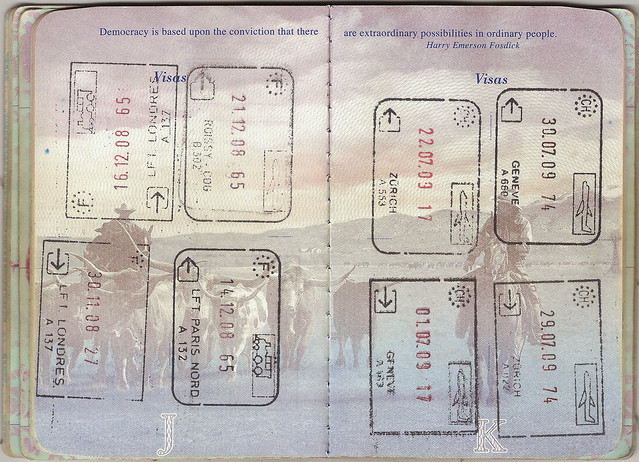 John Morrison Chapel Hill, NC
John Morrison Chapel Hill, NC
It seems fashionable to trash France these days. Bear some facts in mind.
1. They spend half what we do on health care with better results. And no one is heaved out onto the street because he can't pay an outrageously inflated hospital bill.
2. The French eat better than we do and have less obesity.
3. They scowl at "helicopter parenting" which is a rank weed in the landscape of American culture.
4. They have a strong belief that a balanced life is important. No, the overworked American is not more productive and he ain't that happy either.
Do they need to have a more agile economic system? Yes. But they don't need the meatgrinder we have relegated ourselves to as a (very sorry) nation.
Mike Roddy Yucca Valley, California
The French are better than we are, because they like to think in depth about anything whatsoever. Americans were always a little weak here, but now we're a joke. Only in America can a politician get in front of a camera, deny global warming, say he answers only to The Lord, and keep his hands in the trough. It's because the voters are too stupid to pay attention, and if we do, we're too lazy to call them on it and kick them out.
Maureen, I fear that you misunderstand ennui and unhappiness, too. French intellectuals for centuries have distrusted the happy, untroubled soul. It's because once you comprehend the idiocy and meaningless of the world, it should lead to despair, or you're not paying attention.
Further evidence of French superiority is Paris. The buildings are beautiful, and built to last. More important, even today's Frenchwomen have an unforced sexiness about them that makes our public idols like Aniston and Kardashian look like Walmart dolls. French women have full, sexy lips, but they're real, and they move, it's all instinct. When they think, on the other hand, it's with a functioning mind.
I think I'll move there. Marriage proposals from Paris accepted.
Larry Eisenberg nyc
Anatole France, Zola & Manet,
What a brilliant cultural display!
No centuries of slaves,
Or segregation knaves,
Grows more secular by the day.
Ms Dowd sees the French through her eyes,
Not kindly, her insights unwise,
Sees a land in distress,
Minus our Repub mess,
Chacun à son goût I surmise.
Clyde Wynant Pittsburgh, PA, USA
If the French are distressed, I can fully understand why, for they have much to lose. For many reasons, we don't. In the U.S., we measure history in decades, not centuries. We build ticky tacky malls and then tear them down a scan't twenty years later, only to be replaced by even more hideous public buildings. And our citizens applaud such "progress." To us, new is better. We never learned that newness is transitory....
One stroll through The Marais is more life-affirming than a day-long trudge through most American cities, where humans are considered a "problem" to be dealt with, so that the cars can hurtle forward at full speed and where buildings are built not to accomodate those beings, but to impress the Board of DIrectors.
Nostalgia for the past can be maudlin and pointless, when it seeks to evoke a "time that never was," but I believe the French know better.
George Michigan
I think this is exactly like talking only to people in Georgetown and the Upper East Side (which might be only one place in Paris) and then writing about how "Americans" are feeling about the world.
Jim Lockard Ventura County, CA
We just spent 6 weeks there - Paris, Lourdes, Bordeaux and Amboise - everything seemed just fine with those we spoke with. My sense is that the column focuses on a certain socio-economic level of the Parisian population. We heard laughter, saw couples embracing, and people enjoying themselves everywhere we went. And we did not encounter a single snooty waiter.
Carolyn Egeli Valley Lee, Md.
I don't blame the French for being upset. Globalization has ruined so many wonderful cultures, with its dreadful homogenizing of everything. Watching HGTV shows of international real estate is downright depressing over all. The same housing all over the world and the same businesses too, makes me sad. I love to visit Paris, and had some close friends there for many years. Paris is a treasure. And so is the population of the French. But then I love Europe. They seem to know how to live. They savor things.
Mary Scott NY
“We have this feeling that everything we were used to is disappearing and what we are offered is not as good.”
Ms. Dowd could, indeed, have been writing about the US.
"Hello, sadness" reflects the state of mind of so many Americans.
Rob DL Connecticut
What is most unsettling is that this article about a fragmented, fearful, and dissatisfied France can also apply to many nations in the West, including the United States.
The world today enjoys the highest standard of living it's ever known, but it sure doesn't feel like it. We see scientific breakthroughs that seem to belong to a different planet when compared to the many negative stories we have to endure everyday across the news. Computers, smartphones, and all these wonderful gadgets that facilitate our lives -- even entertaining us when we want -- are not enough to cloak what seems to be a very insecure world on the brink of something unpleasant.
I don't know what France needs. I don't know what we need. There is certain to be no silver bullet for any country's problems. But what I fear most, not just in France but in capitals across the globe, is a modern-day Robespierre with an appeal that's enough to tip the scales in favor of a reality we don't want.
Demagogues are the most destabilizing menaces in a depressed economy and culture. With a President here at home dipping in the polls, and a European Union that continues to struggle to justify why it shouldn't be dissolved, one can't help but feel a power vacuum starting to form. With high unemployment and one culture after the next bemoaning the loss of national identity, the climate seems right for a gifted orator to captivate the masses. If that happens, like history promises, we may be in for a long ride.
Kevin Rothstein Jarama Valley
The French will always have their culture; their art; their architecture; their food; their music.
Most of all, the French will always have Paris.
The French will also always have the best national anthem: 'La Marseillaise".
Although most of us are familiar with the music, here is a taste of some of the lyrics; food for thought, especially in these trying times:
To Arms, Citizens
Form Your Battalions
March, March
Let Impure Blood Water our Furrows
And of course, without French assistance, we would still be singing "God Save The Queen".
Vive France!! Vive America!!
Scott W Chapel Hill, NC
Maybe there is a correlation between happiness/contentness and mediocrity. Lots of Americans are very happy eating processed food at chain restaurants, but that does not mean the experience is better than eating like the French. The French just pay more attention to their food, wine, and public spaces, demanding the best and maybe always worrying the quality is slipping. If I had one day left to live, would I rather spend it in Paris, or . . .?
Doug Broome Vancouver
Ma chere Madame Dowd, to be pessimistic is to be French.
It is the Americans who pursue mindless happiness while the French are surrounded everywhere by the great slogan of the Revolution: Liberty, Equality, Fraternity (community). And equality means equality, so don't pity a whiner like Depardieu.
Americans worship their economic elites; the French worship their intellectual elites, regarding their billionaires as occasionally necessary evils to be taxed.
Madame, if you will ouvrez vos yeux, you will note that the French exhibit their pessimism over wonderful food and wine free of the tasteless toxicity of industrial agriculture.
And should existence weigh down on them, they have the world's best medical system to help them.
You refer to "unyielding judgments about talent and its locked labor market."
In the U.S. workers are disposable objects of the oligarchy. In France, workers have rights and neoconservatism is rightly despised as anti-human. The economy serves the people.
The highest universities, les grandes ecoles, are accessible only through merit. Like all of education, they are tuition free. The French are a people who watch intellectual discussion on television and where glorious theatre and opera offer cheap seats for the disadvantaged though the country is largely free of the poverty of America. Education starts at three, and is free.
What the French do not like is the gross materialism and maladroitness of Americans. They value liberty, equality, fraternity.
tom mcmahon millis ma
Perhaps if the French are in such bad straits we, the United States should help them. For all the French bashing, socialist calling, ill will names that are perpetrated upon the French by inconsiderate Americans. Maybe they should all remember if not for the French, the American revolution would not have succeeded. The French are a long and proud people, who have tolorated immense immigration form afar, An influx of devout Muslims, and Africans, have not complained too loudly about it. It has strained social services, furthered unemployment. The EEC is a mess. France insured birth of the United States, it being the 4th of July weekend what could be a more apropo time to say thank you in lieu of, oh I can't say it, flagged it gets me !
Mr. Grolsch Prospect, Kentucky
France is uniquely France and something America will never be. But, then, America is exceedingly uniquely America and something no other country (save maybe Canada, on a bad day) could ever be. I remember the slightly rude cab driver in Paris who, realizing how close to the line he had gone, directed his passenger-seat German Shepherd to bark "Au Revoir" to the nice Americans as we were delivered to Georges Pompidou Centre from the Champs Elysee. And for those for whom the cities of France are too much, God bless the French countryside and the villagers who welcome Americans even as the same villagers may scorn our country's politics but politely ask if we agree with our President. The 1%/47% phenomena are as present in major French cities as they are in their American counterparts, but Frenchmen and women have a maturity and an at least apparent wisdom about life that we do not. A wisdom my wife thinks comes from the frail little women carrying their daily baguettes on the sidewalks from the stores, their faces lined with the reality of World War II, its prelude and aftermath.
Rima RegasMission Viejo, CA
“We are connecting with nostalgia. What is nostalgia? Where the present doesn't agree with the hope that you got in the past.”
These words may have been uttered by a philosophical Frenchmen, but they are certainly applicable on this side of the pond. I keep hoping that the aftermath of the 2010 election that brought our own moroseness to the forefront, will be followed by the 2012 election spunk. We all need a big dose of it for election 2014, if we are to effect the needed changes that will make our present agree with the hope we had in the past.
As for the French? They'll snap out of it too. For all of their plaintive wails of the moment, their pride and ingenuity has always won the day. La Marsellaise, which every French citizen knows, contains these fighting words:
Tremblez, tyrans ! et vous, perfides,
L'opprobre de tous les partis,
Tremblez ! vos projets parricides
Vont enfin recevoir leur prix ! (bis)
Tout est soldat pour vous combattre,
S'ils tombent, nos jeunes héros,
La France en produit de nouveaux,
Contre vous tout prêts à se battre
--
Tremble, tyrants! and you, traitors,
The disgrace of all groups,
Tremble! Your parricidal plans
Will finally pay the price! (repeat)
Everyone is a soldier to fight you,
If they fall, our young heros,
France will make more,
Ready to battle you!
It's time we all snap out of our collective funk.
JT FLORIDA Venice, FL
In your column, you devote 176 words to the musings of a fashion designer's dentist on Avenue Hoche regarding his views about the current mindset of the French.
I would suggest that you get out and talk to average French people. While sipping espresso in the Jardin du Luxembourg with a professor who quantified a 20% "reduction of happiness" due to "unyielding judgments about talent and its locked labor markets", I wish you could have asked her to walk with you around different parts of Paris to see if the reality of meeting real French people squares with her conclusions. Better yet, do it yourself.
Also, go outside of Paris in the summer where French people go to enjoy their concept of "working to live" rather than "living to work." We can learn from the French.
Janice Badger Nelson Park City, Utah, from Boston
"There is but one Paris and however hard living may be here, and if it became worse and harder even – the French air clears up the brain and does good – a world of good." -Vincent Willem van Gogh
So true. Cannot wait to go back this summer.
reader, writer Northern NM
I love France and the French.
It's not the same as when I was there about a half century ago. Les Halles was still in existence. I saw Edith Piaf sing at the 'Bobino' with her ami Theo Sappo. Bud Powell was playing at the 'Blue Note'. And I was a student at the Sorbonne. I love the food, the architecture; the "je ne sais quoi".
Most of all they believe there are more important things than money.
Vive la France with all their imperfections.
simzap Orlando
To perk up their spirits maybe the French should visit Newark and Disneyland. In the one you have the industrial slag that's the end product of consumerism. In the other the banal silly escape that we allow ourselves to make believe the consumerism doesn't lead to the Rustbelt or Bangladesh. The French should feel lucky and proud. And, If they don't they only have to go out and see places that aren't as great as France.
virginia c. maxwell london
We spend half the year in a little French village in South West France - the picture you paint is unrecognizable to us. The markets, the excellent schools, the self sufficiency, the close family ties ..... the excellent hospitals and medical care, infrastructure in good shape --hmmmn
Jose Lopez Argentina
I prefer not to generalize but... Better read and educated people tend to think more comprehensively and by extension better understand the massive challenges that confront us as a species in the 21st century. I know both France and the US quite well and overall the French are far better read and educated than people in the US-- this is especially true in the humanities, philosophy, and the arts- the reflective fields. In France, critical thinking, complex objective analysis, and self reflection is highly valued. Unlike in the US, the French do not believe that there is a tech fix for all that ails you. As a species, we are in it up to our chins - some recognize it others don't.
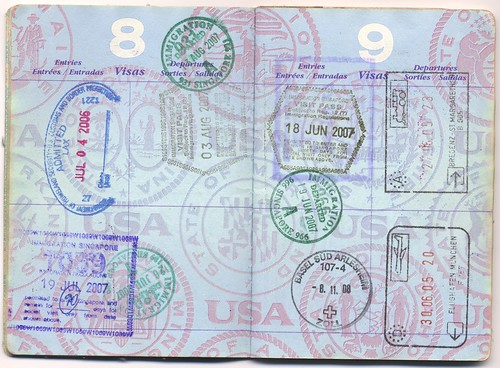 Stephen C. Joseph, MD Santa Fe, NM
Stephen C. Joseph, MD Santa Fe, NM
As many have said above, Paris (especially Couture Paris) is not France, just as BosWash is not America.
As for all the downsides, Maureen, they are not, most unfortunately, unique to today's France.
What country is not currently disgusted by bad government, worried about aimless youth, distressed by shallow and meaningless 'entertainment', terrified by economic uncertainty, hapless at the zoom of technology, adrift in a world turned upside down?
The French are, and have always been, ahead of the global philosophical and emotional curves. And the love/hate between us and them are only two faces in self-reflecting mirrors.
Chris McMorrow Waltham, Mass.
According to Ms. Dowd, " The French are grieving their lost stature and glorious past, stretching back to the colonial empire, the Lumières, the revolution, Napoleon, even the Jazz Age writers and artists." I've got a secret for you, Maureen: the French have been grieving that for a long, long time, not just since Hollande.
During a recent 2-weeks vacation in Paris, my first trip back since my 20s, I was struck by several things that didn't jibe at all with what the guidebooks say about the French.
First, I was hard pressed to find anyone even remotely elegantly dressed. Paris was as slobby as many parts of the US.
Second, the food was simply not as good as I remember it. In fact, the Globe carried an article just last Sunday attesting to what my boyfriend and I had begun to suspect: Outside of a 5-star restaurant, many restaurants are all ordering their food pre-made to be heated up in microwaves. Mon Dieu! It explains why our repeated repasts of confit au canard, boeuf au poivre, et crème brulee, all had a certain sameness to them. The food "scandale" is so upsetting that the government is considering regulations to force restaurants to reveal the source of their menu options.
So, if the French seem more pessimistic than usual these days--and not just due to their recession--it's understandable why. Bad dress, bad food, and bad weather all in the same year? It's enough to make a grown Frenchman (and woman) cry.
William Dufort Montreal
“The French are very conceptual, very cerebral,” Manière said. “We need to have more than food and TV. In America, it is not treason of an ideal if you want to watch TV all day, whereas in France it is.”
That may be. But I beg to differ. I am what you wold call a French-Canadian. My French ancestor came here in the mid1600. We still speak French, my first language, as you may have noticed.
My family and I share an apartment in Sète, a town in the south of France, where I spend at least a few weeks a year. We do not meet the fashion people who you mingle with. But I am happy to count a lot of French citizens as friends. And, believe it or not, they are not what you describe. They are just normal people, like my friends, here in Montreal or in Vermont, where I used to have a boat on Lake Champlain. they, the French, have gotten over Napoleon years ago, so stop portraying them as some kind of zombies.
I don't really know what point is, but what I can tell you is this: People, in France, in America, in Canada and Quebec and the world over want peace and liberty.
Unfortunately, a lot of governments are on the wrong side of the equation.
 kila Oregon
kila Oregon
Mlle. Dowd would probably have a less elitist take on the present French mentality if she left the chic arrondissements and went out to the 'burbs and the countryside and the smaller cities. That's where people do not feel that M. Depardieu's tax rate is so affreuse, that M. Hollande's socialist government should not have ministers with undeclared Swiss accounts and Mme Sarkozy shouldn't be flying on the public tab. The French aren't suffering from malaise. They are suffering from justifiable rage.
JT FLORIDA Venice, FL
We can learn from the French. After their debacle in Vietnam ended in 1954, the U.S. engaged in the same for its longest war until Afghanistan and the outcome in Vietnam was a loss of lives and prestige for the United States. The French correctly pointed out the folly of Iraq and while participating with the U.S. in Afghanistan, they urged caution about surges.
We are linked to France in so many respects. As you toss around a few French phrases in your column, be reminded that about two thirds of English comes from French.
Enjoy your time in France and please, before using words like 'rude' and 'malaise' to describe the French, talk to ordinary citizens about their lives and I think you will find that while they see many challenges ahead, the social critics in the fashion industry, films and even newspapers aren't always accurate.
Ellen Balfour Long Island
I believe the Germans have a word for this French malaise: Weltschmerz, which means world pain, a dissonance between what is and what one wants it to be. Sacre bleu! I am not French, but I do feel a kinship with their values.
B CA
Eh, bien: the ability to maintain traditional French culture has waned since the early 1990's. Part of l'ennui has been the creeping Americanization that began during that decade, from mergers and lay-offs to McDonald's and disposable to-go coffee cups.
The French are right to feel that France is no longer French. The problem is not immigrants or smoking bans, but global corporates taking over.
It's telling that Dowd interviewed not France's modern-day Emile Zola, but... a French management consultant. Vraiment.
Still, it's not over for the country that gave us Hugo, Flaubert, Balzac, and the beacon of truth, Zola. Grab your copy of Zola's "Germinal", Scott, we'll be waiting "aux barricades"!
gblico paris
Most of the negative reactions to Ms Dowd's column seem to be from people who have visited France but have really never lived there. In order to truly understand the French you need to live in France. Being a tourist or an otherwise occasional visitor won't cut it. My wife and I have lived in France for the past 10 years, a period during which we've gained invaluable insights and knowledge about a great country - enough to agree almost completely with everything Ms Dowd has said!
Jeanette Pontacq Point Reyes Station, CA
The French have indeed lost something they treasured ..... France. The former country is now directed from Bruxelles by unelected technocrats. The new President is unloved and boring. Elites genuflect before Germany and the United States. And their vaunted culture is about to disappear via the new free-trade deal.
The French people, like the Americans, thought they were electing someone who would change things for the better and pay attention to them. Instead, like us, they got the reverse.
But at least they still have wonderful cuisine, socialized medicine, long vacations (if they have work), and charming cities and villages. We should be so lucky.
Ben New York City
Many of the points Ms. Dowd raises are conceptually correct. The focus of this being in France is something I can only listen to. I've been to France 3 times, and sadly in Paris three times I've been food poisoned, robbed at gunpoint and nearly pushed off the observatory deck on the Eifful Tower. Having said that, I still esteem the Left bank and the world Henry Miller wrote about, if not glorified. It seems that globalization is eating away at the heartstrings of us all. I agree that IS a sad state...but...we are only in the opening innings of this game. The digital age is less than 20 years old and we need to see if the tearing away of culture is the burning of the forrest to purge disease so a bountiful prosperity can grow anew.
Or at least, I'd hope so.
The problem is we may NOT have an above ground culture for future generations because the WWW (that is, world without wonder) might take 1000 years to clean itself of the toxins we've spewed into the atmosphere.
We've all grown too quickly taking basic nature for granted. One day we shall not have basic resources...THEN the sadness of our current state shall be rationalized.
PT Taiwan
The France you see as a tourist and the France you experience as a resident are two different things. Case in point: I got terribly sick while studying in France and had to stay in the hospital for close to a month. The whole family panicked at the thought of an exorbitant medical bill since my travel insurance doesn't cover what they deem a non-emergency illness and my parents were preparing to take out some of their savings to pay for it when I was finally discharged. Much to our surprise, not only were I promptly enrolled in "Couverture Maladie Universelle" (Universal Illness Coverage), the hospital stay itself and all related medical costs were retroactively covered. More importantly, the French doctors who treated me took time to go over my medical history and diagnosed me with a rare genetic condition which had gone on unnoticed in my native country for several years since its onset.
I doubt my fate would be the same had I been studying English in an Anglo-Saxon country.
The 9th Waltham, MA
It's probably more that we're waking up to just how badly we've let the world slip away from us and fall into the hands of perhaps the most criminal set of governments we've ever been aware of. The best and worst of times, the summer of our discontent, heading for a winter of same, and sensing the chaos of communications that messes with all of nature's cicadian (sic,) rhythms (those 1ce-every-17-years cycles). And these are the times that try men's soles and heels, as we pound the pavement looking for jobs, hoping to find a way to walk the oceans or teleport ourselves, as we can't afford the fare Our manufacturing has been torpedoed by Bangalore, under-bid by Beijing, but one happy fella buys up rusting machines and parts from dead US plants and sells to China--his own Youth In Asia program, while over here we're heading for the real kind of euthanasia or, unwilling participants that we are, preparing for a walk on the genocide.
Who wouldn't feel morosité at the miseries we hired to run our government for us. A speaker of the housers claimed to repeal impeachment by incanting, "Impeachment is off the table." Our current president (was he jokin' us when he claimed to have lectured law students in Con. Law for a decade? He doesn't even know that you cannot amend the Constitution by secret "presidential findings, holdings, decision statements, or even by statute. And his attorney general is a holder of the view that "due process" and "judicial process" are distinguishable.

